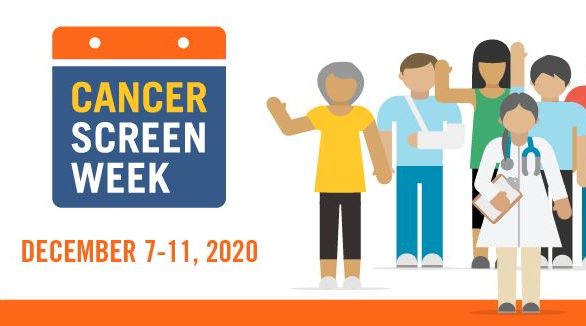
According to the American Cancer Society, screening increases the chances of catching certain cancers early, when they are most likely to be treated successfully. 1 In 2020, more than 606,520 people are expected to die from cancer. Yet, many of those lives could be saved through screening and earlier detection.1,2
December 7-11, 2020, is Cancer Screen Week. The goal: to both ensure you’re armed with information you need to know about cancer screenings and connect you with resources that may help you and your loved ones.
Who should get screened?
Screenings help find certain cancers early, when they are more treatable. Screenings do not in themselves reduce your risk of getting cancer. Many of the common cancers have recommended guidelines for those who are considered most at-risk.
Breast Cancer
A regular mammogram is one of the most important things a woman can do to find breast cancer early – when it’s small, hasn’t spread, and may be easier to treat.6, 7
Screening should continue as long as a woman is in good health and is expected to live 10 more years or longer.
Colorectal Cancer
A colonoscopy not only screens for cancer; if pre-cancerous polyps are found at an early stage, they can be removed, which prevents cancer.9,10
Prostate Cancer
Prostate cancer can often be found early using a simple blood test, but it’s not clear if the benefits of testing all men for prostate cancer outweigh the risks, such as finding (and treating) cancers that probably never would have caused any problems.11
Cervical Cancer
The Pap test can help catch cervical cancer early, when it’s small and may be easier to treat. It can also prevent cervical cancer by finding pre-cancerous cells so they can be treated before they become cancer. The human papillomavirus (HPV) test finds HPV infections which may increase the risk of cervical cancer.8 Even if a woman has gotten the HPV vaccine, she still needs to get regular Pap and HPV tests.
Lung Cancer
Lung screening is done with an annual low-dose CT scan (LDCT) of the chest.12 Screening can help find cancer early, when it’s small and may be easier to treat.1
Skin Cancer
Some people have a higher risk of getting skin cancer than others, but anyone can get melanoma and other types of skin cancer. Although the American Cancer Society does not have screening guidelines for skin cancer, knowing your own skin is important to finding skin cancer early.13
Get Involved. Get Screened!
Everyone can play a role in the fight against cancer.
REFERENCES
1. American Cancer Society. Cancer Facts & Figures 2020. Atlanta: American Cancer Society; 2020. Available at: https://www.cancer.org/research/cancer-facts-statistics/all-cancer-facts-figures/cancer-facts-figures-2020.html. Accessed Aug 18, 2020. 2. National Cancer Institute. Cancer Screening Overview (PDQ®) Health Professional Version. Available at: https://www.cancer.gov/about-cancer/screening/hp-screening-overview-pdq. Accessed Jan. 8, 2018. 3. American Cancer Society. Cancer Screening Guidelines 2017. Available at https://www.cancer.org/healthy/find-cancer-early/cancer-screening-guidelines.html. Accessed Jan. 8, 2018. 4. National Cancer Institute Trends Progress Report. Available at: https://progressreport.cancer.gov/trends. Accessed Jan. 8, 2018. 5. U.S. Department of Health and Human Services. Healthy People 2020. Available at: https://www.healthypeople.gov/2020/topics-objectives/topic/cancer. Accessed Jan. 8, 2018. 6. American Cancer Society. American Cancer Society Recommendations for the Early Detection of Breast Cancer. Available at: https://www.cancer.org/cancer/breast-cancer/screening-tests-and-earlydetection/american-cancer-society-recommendations-for-the-early-detection-of-breast-cancer.html. Accessed Jan. 8, 2018. 7. American Cancer Society. Breast Cancer Screening Resources. Available at: https://www.cancer.org/cancer/breast-cancer/breast-cancer-screening-resources.html. Accessed Jan. 8, 2018. 8. American Cancer Society. How to Prevent Cervical Cancer or Find it Early. Available at: https://www.cancer.org/latest-news/cervicalcancer-testing-can-find-it-early-and-even-prevent-it.html. Accessed Jan. 8, 2018. 9. American Cancer Society. Five Myths About Colorectal Cancer. Available at: https://www.cancer.org/cancer/colon-rectal-cancer/five-myths-about-colorectal-cancer.html. Accessed Jan. 8, 2018. 10. American Cancer Society. Can Colorectal Polyps and Cancer Be Found Early? Available at: https://www.cancer.org/ cancer/colon-rectal-cancer/detection-diagnosis-staging/detection.html. Accessed Jan. 8, 2018. 11. American Cancer Society. American Cancer Society Guidelines for the Early Detection of Cancer. Available at: https://www.cancer.org/healthy/ find-cancer-early/cancer-screening-guidelines/american-cancer-society-guidelines-for-the-early-detection-of-cancer.html. Accessed Jan. 8, 2018. 12. U.S. Preventive Services Task Force. Final Recommendations Statement Lung Cancer: Screening. Available at: https://www.uspreventiveservicestaskforce.org/Page/Document/RecommendationStatementFinal/lung-cancer-screening. Accessed Jan. 8, 2018. 13. American Cancer Society. Can Melanoma Skin Cancer Be Found Early? https://www.cancer.org/cancer/melanoma-skin-cancer/detection-diagnosis-staging/detection.html. Accessed Jan. 8, 2018.